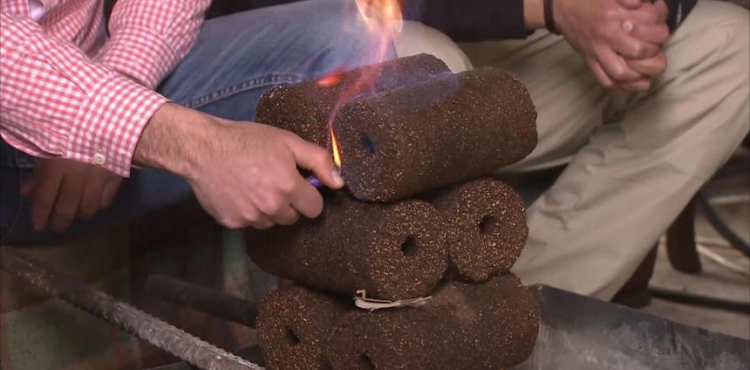Engineers from the Gaza Strip have recently been able to convert olive oil residues (peat) into natural, flammable, environmentally friendly coal used for winter heating.
Thousands of tons of olive oil residues are usually dumped on farmland or bird and animal farms to absorb the deadly cold in winter, but this results in environmental and health damage.
These damages prompted three engineers, Tamer, Khalid Abu Taaima and Osama Qudeih, residents of Khanyounis city in the southern Gaza Strip, to add chemicals to the smelly peat in order to get rid of them and make it usable for human use, and then be pressed through a hand machine, to extract cylinders from them. 10-20 cm long per cylinder.
Engineers leave the callat cylinders and cubes produced in the sun for three days until they are fully dried, thus becoming flammable coal for the longest duration and human usable.
According to the engineers involved in the initiative, farmers and bird farmers, as well as citizens, benefit most from them, contributing significantly to saving money, effort and getting the necessary warmth without environmental damage to the health of production.
The people of the Gaza Strip are preparing for winter, and usually suffer from worsening power outages, preventing them from receiving the necessary heating, and forcing them to seek alternatives through firewood, which harms human health or waxing.
The wax ing had already caused fires inside houses, causing casualties among the occupants, as a result of the use of these rudimentary means to light and heat due to the cold weather.
Tamer Abu Tayema, 24, one of the engineers in charge of the initiative, said Gazans have suffered over the past years from the lack of safe heating in the face of a power outage and the lack of money to use alternatives.
Abu Taaima explains that he and his colleagues are working on producing dried and dried olive dried dried olives to provide residents with safe alternatives to heating without having to spend more money.
While extracting a number of peat cylinders from his piston machine, he adds that the peat factory is environmentally friendly, "since after studies and chemical processes we were able to overcome the unpleasant odors of olive residues while using it in heating without causing any health damage."
He points out that he and his colleagues obtained a degree from Al-Azhar University in the Gaza Strip, stating that the modified peat, which they worked to produce, was environmentally friendly and could be used safely for human health.
Khaled Abu Taaima, a 25-year-old colleague in the initiative, said the manufacture of olive dried in flammable molds is working to address environmental and economic problems, as long as they are burdening olive farmers and farmers in the Sector.
According to Abu Taaima, the remnants of the olive age account for about 40 percent of the total amount of olives that are squeezed annually.
He explains that solid olive-age residues are not biodegradable, causing health damage if they accumulate for long periods.
He points out that farmers are forced to cut down trees in order to sell wood used for heating, resulting in a lack of cultivated land, and warned that the crisis was another incentive to think about their project.
"We were able to get a little funding and buy a small piston, so we could help the environment preserve it and produce friendly wood, which is on fire for a longer period and costs less for citizens in general," he says.
For his part, the spokesman for the municipality of "Absan" in Khan Younis Mohammed Abu Yusuf, the municipality embraced the "pioneering youth project" and worked to help engineers to produce wood "dried olives" environmentally friendly.
Abu Yusuf said the project´s support came in support of youth projects that contribute significantly to environmental protection and the creation of projects that will support economic and development at the same time.
He notes that the municipality was disposing of olive residues by selling them raw to farmers ,"but this was causing problems for the soil and air environment," noting that the modified molds had become environmentally friendly.
About 600 tons of olive residue in the large town of Absan in Khanyounis are now being used without any harm to the environment, human or animal alike, Abu Yusuf said.
The olive harvesting and harvesting season begins in October each year, as it is considered one of the most important annual seasons for the population of the Gaza Strip, especially with the availability of a large number of trees that cover a large part of the population´s oil and olive needs.
The area of olive trees in the Gaza Strip is about 38,000 dunums, according to Mohammed Abu Odeh, head of the tree gardening department at the Ministry of Agriculture in the Gaza Strip, noting that about 28,000 dunums of them are productive.
According to Abu Odeh, this year´s production of olives is estimated at 650 kilograms per dunum, with a production area of 20,000 tons, down from 30,000 tons last year.
Abu Odeh expects that 5,000 tons of output will go to the abandoned, and 15,000 tons for the operations of the era, distributed on 29 olive presses extending from the north of the Gaza Strip to the south, with 2,700-2,800 tons of oil.
According to Abu Odeh, the Gaza Strip needs up to 4,000 tons of oil per year, which means a total deficit of 1,200 tons of oil.












